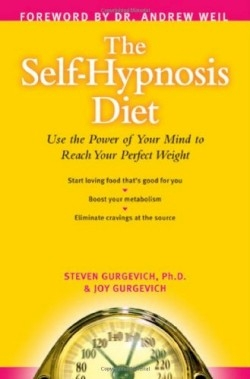
The Self Hypnosis Diet
Use the Power of Your Mind to Create Your Perfect Weight
The self-hypnosis diet is not a diet, insist the authors (who are behavioral nutrition experts) from the outset. They call it a way to modify behavior through self-hypnosis so that their readers can eat anything they want and keep their perfect weight.
“Hypnosis” is a concept that makes a lot of people uneasy. The Gurgeviches tackle it early on, dispelling some stubborn myths. Since all hypnosis is self-hypnosis, it’s impossible to put anyone in a self-hypnotic trance against their will. Nor can people under hypnosis be made to do things that violate their values.
“Hypnosis,” they write, “is a system or collection of methods that enable mind and body to share information more effectively … the focused intention of your consciousness magnifies your power of belief (and the capacity of your belief) to cause your subconscious mind to accept and act upon intention.”
That, in a nutshell, is how the self-hypnosis diet works.
The authors characterize the hypnotic state as similar to a light trance or day-dream—something everyone experiences without realizing it. Exercises on the CD that comes with the book help induce that trance, and guide the reader towards harnessing it to the will to achieve and maintain perfect weight (not, it’s important to note, a coveted body shape).
Overwhelmed by information on practically every other aspect of their lives, Americans are grossly under-informed about health. The Gurgeviches cite studies showing that sixty-five percent of Americans have never attended a nutrition class, and fifty percent have never taken a fitness class.
“Since 65 percent of Americans are overweight,” they ask, “could there be a correlation between being overweight and the absence of information about nutrition and fitness? We think so.”
Their method is a collaboration between conscious and subconscious minds. There’s a chapter on nutrition to help readers make informed, healthy food choices, as well as tips called “Motivation Makers” and “Belief Boosters” scattered throughout. “Slim people stand about 150 minutes more each day than obese people,” one such motivator advises. “Just that simple change burns 350 calories.”
Numerous case histories also offer inspiration.
The Self-Hypnosis Diet offers hope for serial dieters who lose weight with each fad diet only to gain it back again. The authors are colleagues of renowned alternative medicine guru Andrew Weil, MD, at the Program in Integrative Medicine at Arizona College of Medicine, where Joy Gurgevich is a behavioral nutritionist and her husband Steven Gurgevich is a health psychologist. In his introduction to The Self-Hypnosis Diet, Dr. Weil gives the Gurgeviches’ techniques the best of recommendations: “They work for me,” he says.
Reviewed by
Marilyn Bowden
Disclosure: This article is not an endorsement, but a review. The publisher of this book provided free copies of the book to have their book reviewed by a professional reviewer. No fee was paid by the publisher for this review. Foreword Reviews only recommends books that we love. Foreword Magazine, Inc. is disclosing this in accordance with the Federal Trade Commission’s 16 CFR, Part 255.
